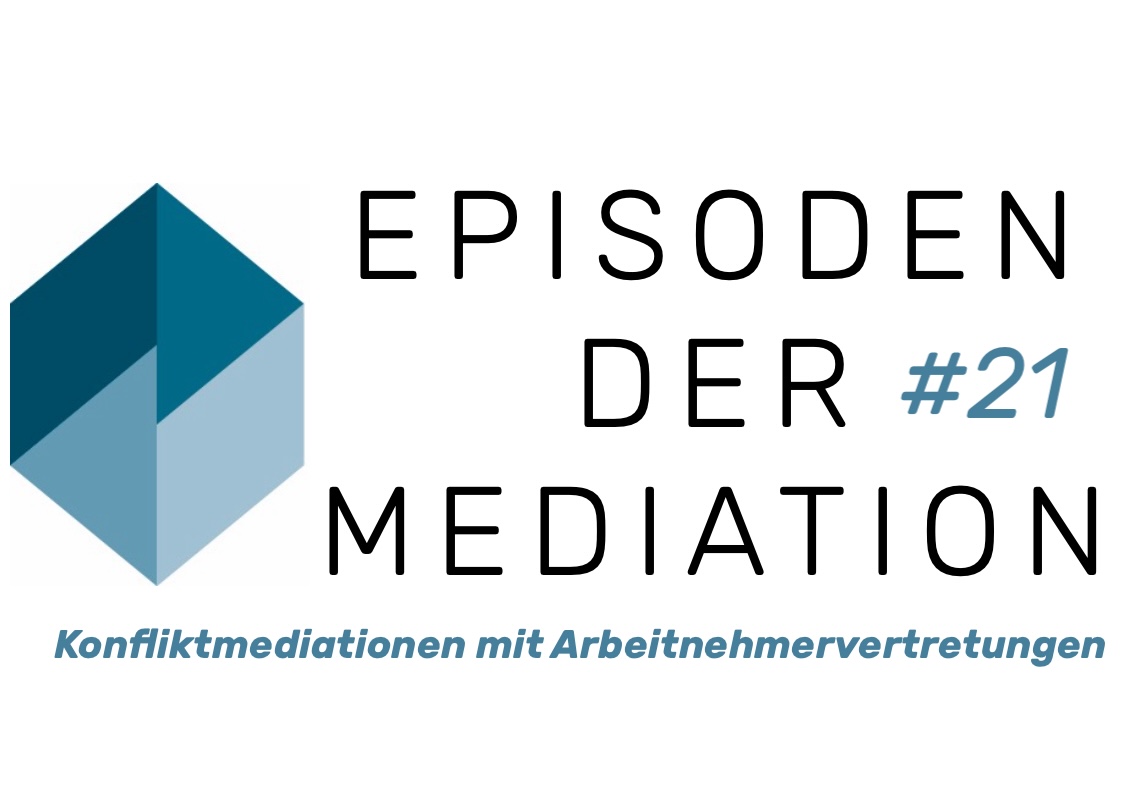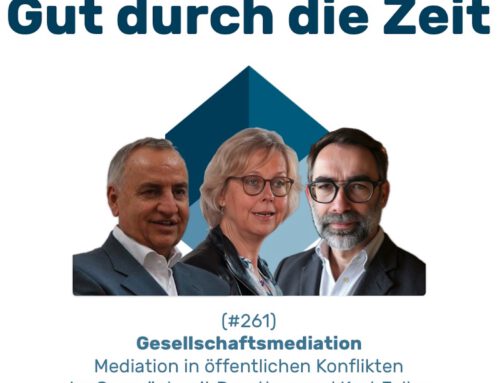#21 EdM – Conflict mediation with employee representatives
Different mediation constellations in the context of works councils, staff councils or employee representatives.
Episodes of mediation.
The podcast on practical questions about mediation and conflict management.
Welcome to the episodes of mediation,
the INKOVEMA podcast on the practical issues of mediation and conflict management.
I am Sascha Weigel and in this podcast I explain case questions from my mediation and conflict counselling practice. I present concepts and models of mediation and categorise different perspectives and decision-making options.
This is episode 21 – Conflict mediation with employee representatives
Different mediation constellations in the context of works councils, staff councils or employee representatives.
In the previous episode, I discussed the challenges that the structural characteristics of employee representatives in organisations pose for mediative conflict management.
I have the starting point that it is about organisational mediation, which ultimately only one Client namely the organisation. For the order clarification process, this would mean that this clarification process, which the organisation, represented by the GF/HR with the mediation, The mediation talks in the narrower sense, the actual mediation talks, must be preceded by the mediation process itself - in contrast to classic mediation.
However, this approach, which is important for organisational mediation, would disregard the special (collective) rights and thus the position of the works council. For mediation and organisational consulting, it is therefore quite practicable if the works council is a party to the dispute(!), the Procedure of a classic mediation in which two equal partners wish to engage in mediation (or not, which is the case in the contract clarification process, i.e. in the contract phase – episodes 13 and 14). From a practical point of view, the works council can therefore be regarded as an independent organisation of the organisation for the purposes of process consulting in the sense of mediation and organisational consulting. Although the works council does not exist without the organisation, the rights of the works council conferred by the Works Constitution Act mean that it is an independent organisation within the scope of these rights, which can also be treated as such by external consultants.
In summary: In the case of organisational mediation in which the employee representatives are parties to the conflict, it is possible to proceed by way of classic mediation, i.e. mediation between two parties to the conflict who have equal rights or, better still, are not mutually authorised to issue instructions.
I am currently working as a mediator in an industrial company for the site management and the site works council, who negotiated this mediation in order to prevent the escalating step to the conciliation committee. The motivation for mediation can also be found in this area of tension, as not all people in these committees and groups of people are convinced of this approach – and also express this.
However, I would like to draw attention to another peculiarity that I have come across in practice in recent weeks: An employee at a large scientific institution requested mediation with colleagues and special representatives after complaints about his behaviour led to him receiving formal instructions from his employer that restricted him from carrying out his usual way of working. He opposed these instructions, advised and represented by a lawyer, and suggested mediation with the complainants.
The case does indeed still have many aspects that are interpreted very differently and are not entirely unproblematic for mediation itself. The following point is important to me here: The formal instruction initially stands in the way of the intended mediation discussions between the immediate colleagues, because these discussions cannot eliminate these instructions, but they can certainly undermine their authority.
That is why I have followed the path of first organising mediation talks between the employer's representatives and the person instructed, in which these parties to the conflict have the opportunity to explain to each other what they expect from each other and what their interests are, but above all to clarify the guidelines that may have been violated, even if unknowingly.
And only then is it possible, if necessary, to conduct direct mediation discussions between colleagues and special representatives, and possibly also with the organisation's clients. I can't go into more detail here because I'm talking about structural mediation in this educational podcast, not gossip. However, I hope I have been able to clearly convey the structures and clarify and answer the questions that arise for mediators here.
I would like to introduce a third and final constellation with an employee representative body into this episode: a long-established family business, set up as a globally active group, has a production site that is also viewed with concern at headquarters. The conflicts at the site, in which not only the site management and the site works council are involved, but also large parts of the workforce, lead to the fact that mediation between company representatives and the works council committee is desired on site and is also arranged at the request of all. A rather complex search and decision-making process then led to me and my team being allowed and willing to act as mediators.
Even though the collective rights of the works council were definitely at issue here, i.e. they were at least involved in the conflict communication, I and my team did not structure the situation conceptually in such a way that we assumed a classic mediation between two equal or mutually unauthorised parties (employer and works council). – as mentioned above – mutually unauthorised parties to the conflict (employer and works council), but instead recommended treating the site management on the one hand and the works council on the other as parties to the conflict – and to conceptualise the group management, i.e. the management figures at the head office, as the commissioning person (group) that grants mediation to the parties to the site conflict, with the desire and mandate to resolve the conflicts and restore joint working capacity, i.e. to negotiate the conditions for this.i.e. to negotiate the conditions for this.
That’s it for this time, thank you very much for listening, and perhaps you were able to develop one or two ideas for one of your cases, take them further and make decisions. I wish you every success!
If you would like to support this podcast, please leave feedback on Apple Podcast or on Google Business.
For now, I bid you farewell with my best wishes. See you next time!
Get through this time well!
Dr Sascha Weigel





Leave A Comment